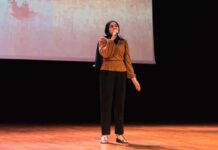From dessert for breakfast, to bringing people together; this is what Eid means to Pakistanis
By Sara Hameed
SHARJAH – “That is one of my favorite memories; it was just us sisters.”
Zaheen Fatima, student at the Fatima Memorial Hospital College of Medicine and Dentistry in Lahore, recalls fondly the Eid where she and her twin sister were around nine.
“Mama had gone to Pakistan” during Ramadan; and had brought back matching outfits for them, and an older sister. In the late 2000s, among the latest fashions was a hairclip with a colorful extension attached to it. The three of them matched those, too.
Zaheen excitedly narrates how after the elders would return from the Eid prayer, it was tradition to eat sheer khurma, then distribute Eidi.
“We used to get five dirhams, but it felt like so much money,” she smiles.
The five sisters would scurry down to the supermarket, and with their precious Eidi, buy snacks and “those white things” that turned out to be throw-down crackers. There were toy guns loaded with crackers as well.
Squeezing onto their balcony, they would throw them on the floor and tuck their heads behind the railing, giggling uncontrollably when passersby would try and guess where the crackling is coming from.
Aliza Mahmood has lived in the vibrant city of Lahore her entire life. She gently explains how, in Pakistan, Eid preparations begin the instant Ramadan rolls around. It is customary for everyone to wear new clothes, and for girls, to adorn henna and jingling bangles.
Noor Fatima, a recent graduate from the University of Wollongong, Dubai, says she has been “obsessed” with the smell of henna ever since she was young; and admits to splurging on designs, and trying her best to get it applied a day before the occasion.
Meanwhile, Zaheen details how two things are essential for Pakistanis when it comes to Eid: clothes and food.
First, she chirps, one would want to decide on their color palette for what they want to wear. Then, come the accessories.
“You want to get nice Desi, chunky jewellery,” and also khussay.
As for food, she believes it is mandatory even if one is not expecting guests, to prepare sheer khurma for breakfast after the Eid prayer. As you get ready after, “you just sit dressed up,” regardless of whether you have to go anywhere or not.
Noor finds the difference between celebrating Eid in Pakistan and anywhere else, is that in Pakistan, there is a larger sense of community.
“In Pakistan, I used to love dressing up.”
It has been 12 years since Sundas Rizwan, current Sharjah resident, left Pakistan; and leaving Pakistan has meant keeping Eid simpler, mainly because it is just herself, her husband and their daughter now.
They have never gotten the chance to return to celebrate Eid, and so, they carry remnants of home wherever they go. This includes preparing traditional dishes and decorating their home.
Rizwan has lived in Malaysia, Singapore and Russia, before finally moving to the United Arab Emirates in 2019. She reveals Singapore was vastly different, as it was her first time outside of Pakistan. While unfamiliar with the Pakistani community living there, fortunately, their Pakistani friends made it worthwhile.
“We all dressed up, wearing shalwar kameez,” she gleefully continues.
In Russia, Rizwan and her family settled in the industrial city of Astrakhan, on the banks of the Volga River. They were the only Pakistanis for miles, and so, her three to four Eids there were among the most difficult, yet the most memorable.
There is a hustle and bustle in Pakistan, where guests are scrambling in and out of your home, and you are visiting them. Astrakhan would have been silent had Rizwan not met her husband’s Indonesian and Malaysian colleagues. So, they got to experience a different Islamic culture altogether.
“I will always cherish that,” Rizwan says, because to her, it was a once-in-a-lifetime opportunity, especially since she never could have believed she would be happy celebrating Eid in such an extreme place.
For Noor, it is a similar situation because she has only ever celebrated Eid in Dubai, and it is her first one back in Lahore. Zaheen exclaims Eid mornings mean visiting their grandparents for
breakfast and feasting on sweet halwa with flaky puri and kulchay, then visiting their aunt for lunch and devouring favorites biryani and haleem.
Someone who is not a Pakistani can be introduced to their traditions through being invited over for Eid and treated to flavorful Pakistani dishes. In Noor’s eyes, one could gift them the shalwar kameez, or maybe even just a kurta to “give them a feel” of how Pakistanis embrace their culture.
“It’s deep-rooted wherever you are,” Rizwan believes.
Rizwan highlights it is important to carry on traditions one has learnt from their parents and goes back to her Indonesian friend. How she enjoyed the Indonesian way of celebrating Eid, they similarly embraced Pakistani traditions.
Traditions are what connect people living outside their native countries, and even if they do not celebrate Eid, they are still welcome to partake in the festivities.



















